Related Research Articles
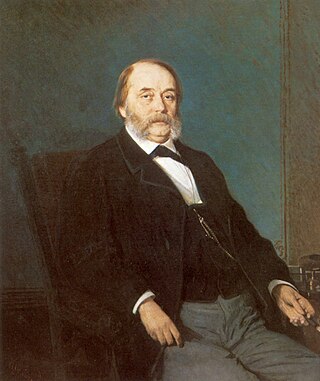
Ivan Alexandrovich Goncharov was a Russian novelist best known for his novels The Same Old Story (1847), Oblomov (1859), and The Precipice. He also served in many official capacities, including the position of censor.
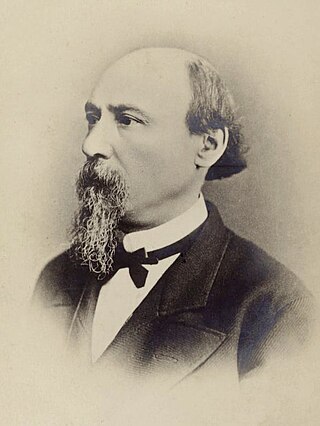
Nikolay Alexeyevich Nekrasov was a Russian poet, writer, critic and publisher, whose deeply compassionate poems about the Russian peasantry made him a hero of liberal and radical circles in the Russian intelligentsia of the mid-nineteenth century, particularly as represented by Vissarion Belinsky and Nikolay Chernyshevsky. He is credited with introducing into Russian poetry ternary meters and the technique of dramatic monologue. As the editor of several literary journals, notably Sovremennik, Nekrasov was also singularly successful and influential.

Vissarion Grigoryevich Belinsky was a Russian literary critic of Westernizing tendency. Belinsky played one of the key roles in the career of poet and publisher Nikolay Nekrasov and his popular magazine Sovremennik. He was the most influential of the Westernizers, especially among the younger generation. He worked primarily as a literary critic, because that area was less heavily censored than political pamphlets. He agreed with Slavophiles that society had precedence over individualism, but he insisted the society had to allow the expression of individual ideas and rights. He strongly opposed Slavophiles on the role of Orthodoxy, which he considered a retrograde force. He emphasized reason and knowledge, and attacked autocracy and theocracy.
Victor Olegovich Pelevin is a Russian fiction writer. His novels include Omon Ra (1992), The Life of Insects (1993), Chapayev and Void (1996), and Generation P (1999). He is a laureate of multiple literary awards including the Russian Little Booker Prize (1993) and the Russian National Bestseller (2004), the former for the short story collection The Blue Lantern (1991). His books are multi-layered postmodernist texts fusing elements of pop culture and esoteric philosophies while carrying conventions of the science fiction genre. Some critics relate his prose to the New Sincerity literary movement.
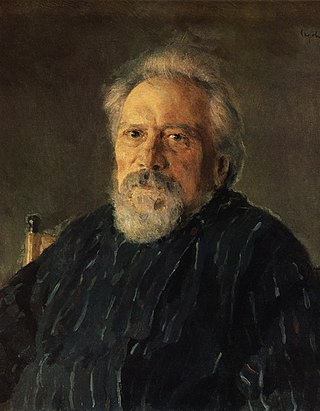
Nikolai Semyonovich Leskov was a Russian novelist, short-story writer, playwright, and journalist, who also wrote under the pseudonym M. Stebnitsky. Praised for his unique writing style and innovative experiments in form, and held in high esteem by Leo Tolstoy, Anton Chekhov and Maxim Gorky among others, Leskov is credited with creating a comprehensive picture of contemporary Russian society using mostly short literary forms. His major works include Lady Macbeth of Mtsensk (1865), The Cathedral Folk (1872), The Enchanted Wanderer (1873), and "The Tale of Cross-eyed Lefty from Tula and the Steel Flea" (1881).
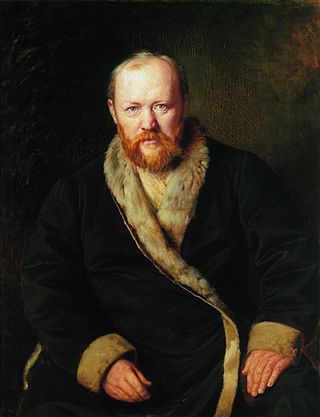
Alexander Nikolayevich Ostrovsky was a Russian playwright, generally considered the greatest representative of the Russian realistic period. The author of 47 original plays, Ostrovsky "almost single-handedly created a Russian national repertoire." His dramas are among the most widely read and frequently performed stage pieces in Russia.
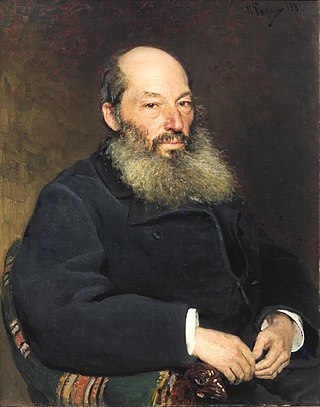
Afanasy Afanasyevich Fet, later known as Shenshin, was a renowned Russian poet regarded as the finest master of lyric verse in Russian literature.

Apollon Nikolayevich Maykov was a Russian poet, best known for his lyric verse showcasing images of Russian villages, nature, and history. His love for ancient Greece and Rome, which he studied for much of his life, is also reflected in his works. Maykov spent four years translating the epic The Tale of Igor's Campaign (1870) into modern Russian. He translated the folklore of Belarus, Greece, Serbia and Spain, as well as works by Heine, Adam Mickiewicz and Goethe, among others. Several of Maykov's poems were set to music by Russian composers, among them Rimsky-Korsakov and Tchaikovsky.

Apollon Aleksandrovich Grigoryev was a Russian poet, literary and theatrical critic, translator, memoirist and author of popular art songs.

Georgy Ivanovich Chulkov was a Russian Symbolist poet, editor, writer and critic. In 1906 he created and popularized the theory of Mystical Anarchism.
Grigoryev or Grigoryeva is a Russian surname. It is derived from the Latinized Greek name Gregory (Grigorios). Alternative spellings of this last name include Grigoriev (masculine) and Grigorieva (feminine). Notable people with that name include:

Yakov Petrovich Polonsky was a leading Pushkinist poet who wrote poems faithful to the traditions of Russian Romantic poetry during the heyday of realistic prose.

Nikolai Alekseevich Polevoy was a controversial Russian editor, writer, translator, and historian; his brother was the critic and journalist Ksenofont Polevoy and his sister the writer and publisher of folktales Ekaterina Avdeeva.

Moskvityanin was a monthly literary review published by Mikhail Pogodin in Moscow between 1841 and 1856. It was the mouthpiece of the Official Nationality theory espoused by Count Sergey Uvarov. The literary section was edited by Stepan Shevyrev. Gogol's novella Rome was first printed in Moskvityanin, as were many Slavophile papers. In 1850 the magazine was taken over by a young generation of Slavophiles which included Apollon Grigoryev. Their object of adulation was Alexander Ostrovsky. The frequency of the magazine switched from monthly to biweekly in 1849.

Epoch was a Russian literary magazine published in 1864-65 by Fyodor Dostoyevsky and his brother Mikhail.
The Poor Bride is a play by Alexander Ostrovsky, written in 1851 and first published in the No.4, 1852 issue of Moskvityanin magazine. It was his second play to be staged at the Maly Theatre, where it premiered on 20 August 1853.
A Protégée of the Mistress is a play by Alexander Ostrovsky, first published in the No.1, January 1859 issue of Biblioteka Dlya Chteniya. Refused the permission to be produced at the Imperial Theatres in October 1859, it premiered in Maly Theatre, Moscow, only on October 21, 1863.

Russkoye Slovo was a Russian weekly magazine published in Saint Petersburg in 1859–1866 by its owner, Count Grigory Kushelev-Bezborodko.

Who Lives Happily in Russia? is an epic four-part poem by Nikolai Nekrasov, which he started publishing in January 1866 in Sovremennik and Otechestvennye Zapiski. Its fourth part, "The Feast for All the World" (1876–1877), remained unfinished.

"A Malefactor" is an 1885 short story by Anton Chekhov.
References
- Brockhaus and Efron bio (in Russian)
- brief bio on Khronos page (in Russian)
- Grigoryev, Apollon, My Literary and Moral Wanderings, tr. Ralph E. Matlaw (New York: Dutton, 1962).